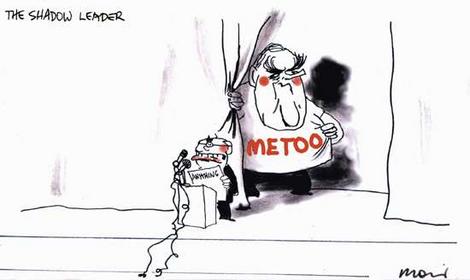|
October 6, 2005
I was attracted to this Alan Moir image because it does capture the dilemma of the federal ALP during a period when the conservative Howard Government skillfully manages the overwhelming forces of economic security and national security.

Whenever the ALP tries to angle for support from a progressive liberal left in the inner city then it alienates the blue-collar base in suburban electorates ever more. And visa versa. The ALP needs both sections of the electorate to win elections. At the moment this looks like squaring the circle, despite the little traction that is being gained from the proposed industrial relations reforms.
Labor's crisis is deep and it is real crisis. Are people bothering to listen to what Labout is saying? Are we citizens tuned in?
What seems to be happening is that in this crisis situation the leader's performance becomes a kind of shorthand for the problems of a fractured and splintered party. Beazley's performance---his ability to cut through the media noise---is under scrutiny. The tensions are being played in terms of the jostling for the leadership, and in speeches made about what the ALP needs to do to gain electoral support.
Julia Gillard has given such a speech. How does she address the crisis faced by the ALP? In the speech she acknowledges that:
Labor has lost significant support from the beneficiaries of economic change, the former employees who are now the contractors and small business people of outer suburbs and regional centres. But the hard question for Labor is whether they have deserted Labor or Labor has deserted them.
Probably a bit of both.
Then she adds that:
It is right for Labor to be concerned about poverty, about the plight of those on welfare, about the hardships faced by the sick, the marginalised and the victims of economic change. Labor is the party of compassion but it is not or should not be the party of welfarism.
We are then offered an interpretation of what this means:
The economic agenda needed today differs from the one that was needed in the 1980s and 1990s. In the 1980s and 1990s, the economic challenge was to open our economy and extend the reach of competition. Labor proved we were up to that challenge. We did what needed to be done, at times at our own political expense.
However, in the decade ahead, the economic agenda is about participation and productivity. The abilities of our people -- our 'human capital' -- is what the OECD now describes as 'the fundamental building block' of economic policy. This new economic agenda is about opportunity, and opportunity for all.
What does that mean? Is it the 'me tooism' of the cartoon? Do not the conservatives talk this way? What about the concern for the negative social and environmental effects of the deregulated market? Shouldn't that also be the ALP's concern?
Gillard says that the ALP can "...increase participation and productivity by investing in the health and skills of our people, and rewarding their hard work. Health, education and work – these are Labor issues and they should be at the core of our economic policies for the next decade." Maybe they are. But how does the ALP differ from the conservatives on these issues? Gillard says:
Whereas the economic reforms of the 1980s and 1990s -- by their nature--were at times painful, the new agenda presents an opportunity for Labor. But we need to have the courage to claim it as our own. Improving health, education and work outcomes for people---this is one way we make the case to the Australian people for Labor and for change.
What is the case? How is health to be improved?
Gillard says nothing about democracy in terms of helping Australians to imagine a better future. Shared values and bonds are mentioned. Democracy is missing from the ALP's new, and very thin agenda. Lots more strategic thinking is required.
|

Beazley knows what he is doing. Howard and Beazley both know what is going on, Howard got to be PM the same way that Beazley probably will. Australia has a waitocracy. You just have to hang around, and hang around, until you finally get a go. Howard has been called lazarus on a triple bypass, Beazley looks like he will be the same.
You just have to keep hanging on, and on, and on; until a recession comes, or the government falls to hubris and arrogance. Then you swap the arrogant government, for an opposition which is pretty much the same, except for a couple of things.
This is why we need term limits on the PM. To protect our system from the parties, executive cabinet, a risk adverse electorate, and the slow oscillation of governmental change.